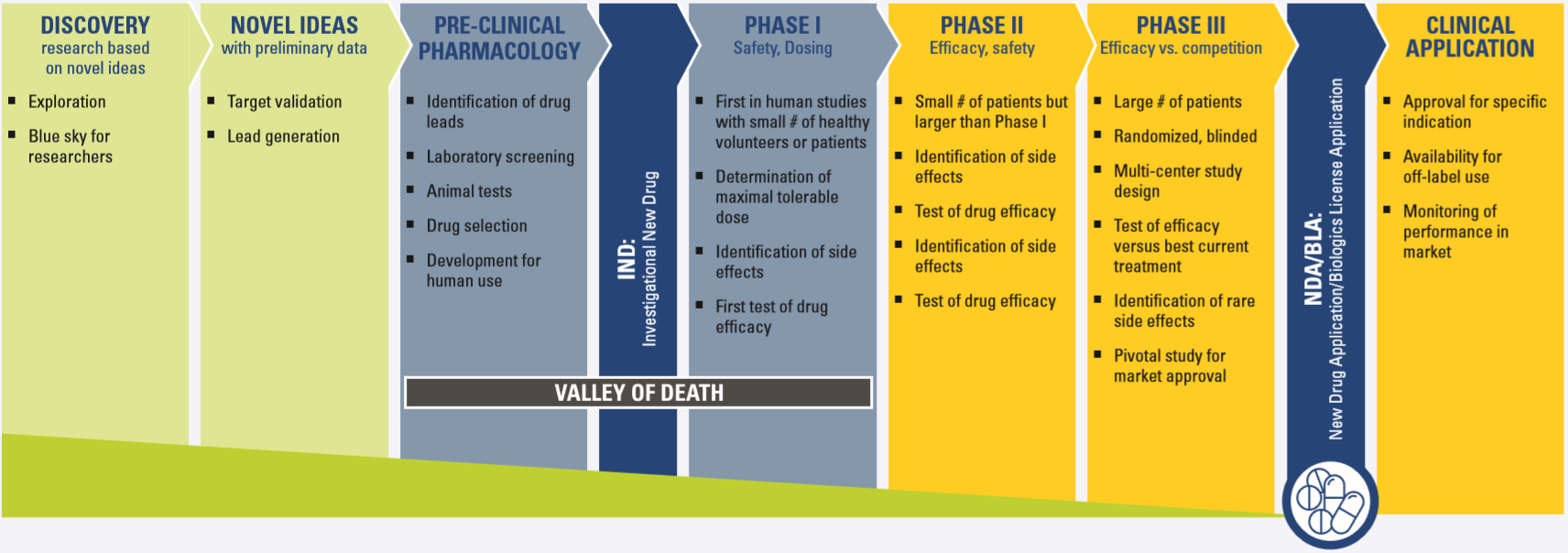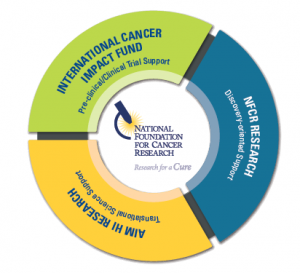Notable Research Achievements: Snapshot of Cancer Research Progress in 2018
Made Possible by National Foundation of Cancer Research and Supporters
NFCR provides outstanding researchers with the vital seed funding they need in their laboratories to pursue the next advancement in cancer research—more than $150 million since 1973. From life-saving breakthroughs in immunotherapy and anti-angiogenic therapies to advances in metastatic research, cancer genetics, precision medicine and more, NFCR-funded scientists have led the way into a new era of cancer prevention, detection, and treatment. We are committed to helping scientists translate promising cancer discoveries into cures by funding innovative research.
In the last decade, NFCR has supported
60
scientists who have registered
57
inventions, innovations,
discoveries and breakthroughs.
With these breakthroughs, NFCR-funded scientists have established
16
companies with new approaches to diagnosing and treating cancer, benefiting countless patients
Notable Research Highlights
For the laboratory-based, discovery-oriented research that we have so proudly been supporting for four decades, NFCR-funded scientists continue to make remarkable advances in the fi ght against cancer, with support from loyal donors like you. Here is a snapshot of research progress in 2017 made possible by your generous donations.
Detection and Treatment of Early Liver Cancer

Liver cancer is a leading cause of cancer deaths worldwide, accounting for more than 600,000 deaths each year. In the U.S., liver cancer incidence has more than tripled since 1980. Treatments for liver cancer are generally ineffective, and only one out of every five patients survives 5 years or longer after diagnosis. When detected early, liver cancer can still be treated much more effectively than late stage disease; however, currently less than half of the patients are detected in early stages. A team of NFCR-funded scientists is working to fill both gaps with one solution. The team has developed a new sensitive molecular imaging probe that can detect even a minute amount of a molecule called PMSA which exists in the vasculature of liver cancer. This makes early detection of small liver tumors possible. In addition, the radioactivity carried by the probes can kill the cancer cells at the same time, suggesting that these probes could become a potential therapy for this deadly disease. Ongoing success of the work holds promise to the development of dual-function, double-power probes that are able to both detect and treat liver cancer in its early stage. James Basilion, Ph.D., NFCR Center for Molecular Imaging, Case Western Reserve University, Cleveland, Ohio
NFCR scientists and collaborators have provided the first evidence that the century old model for cancer metastasis – where cancer spreads from the primary tumor, to nearby lymph nodes, and then to other organs – may not apply in all cases. Using patients’ biopsy tissue samples, the scientists developed a simple test to analyze mutation-prone segments in DNA and determine the relationships between cancer cells at the primary tumor, lymph nodes and distant site from the same patient. Results showed that for the majority of colorectal cancer patients studied, distant metastases originated directly from the primary tumor without involving the lymph system in the process. More research is needed to learn if clinical outcomes are different for patients with metastases through lymph nodes or without lymph node involvement. This safe and cost-effective way to analyze the evolutionary path of cancer could potentially be used in the clinic to help guide clinical management of patients with metastatic cancer. Rakesh K. Jain, Ph.D. Massachusetts General Hospital, Boston, Massachusetts
Cancer May Spread Without Lymph Node Involvement

Combining Gene Therapy with Immunotherapy to Treat Late Stage Prostate Cancer

Adoptive Cell Transfer (ACT) is a powerful immunotherapy that involves a collection of a patient’s own immune cells for cancer treatment. This therapy is recently approved for treating blood cancers, and Dr. Paul Fisher is taking an innovative approach to use ACT for combating late stage, metastatic prostate cancer. In this new approach, doctors first collect the immune T cells (a subset of lymphocytes that play a central role in disease fighting), expand them in numbers, and then arm the T cells with a gene called MDA-7/IL-24. Discovered in Dr. Fisher’s lab, the MDA-7/IL-24 gene encodes a powerful protein (“cytokine”) that modulates the human immune system, eliminates metastatic tumor cells and has shown potent effects in preventing bone metastasis—a painful and often lethal condition for prostate cancer patients. Once injected back into prostate tumors, the “supercharged” T cells will home into local and distant metastatic sites, releasing the cytokine to direct cancer cell suicide. If proven effective in pre-clinical experiments, this combination therapy can advance quickly to clinical trials, getting one step closer to delivering new therapy for treating the deadly metastatic prostate cancer. Paul B. Fisher, M.Ph., Ph.D., Virginia Commonwealth University, Richmond, Virginia
Aminoacyl-tRNA synthetases (aaRS) are a family of ancient exquisite enzymes responsible for protein synthesis—a basic requirement for all living things. In recent years, NFCR-funded scientists who are leading experts in aaRS research have discovered that these enzymes also carry other vital, yet unexpected biological roles. For example, they found that one aaRS enzyme, SerRS, may be a new tumor suppressor. Their experimental data shows that SerRS inhibits c-Myc—a regulator gene that itself is very often found to be upregulated in many types of cancer. Inhibition of c-Myc subsequently turns off the downstream genes c-Myc controls. These downstream genes include VEGF whose function is required for tumor survival. This new role of SerRS to suppress cancer is currently under close investigation and may lead to potential therapeutic applications. Xiang-Lei Yang, Ph.D., The Scripps Research Institute, San Diego, California
Ancient Enzyme May Be a Tumor Suppressor

New Initiative of the Year:
The NFCR Research Ecosystem
Cancer research follows a path from an idea, through several stages of laboratory work, to clinical trials that, when successful, ends in FDA registration and approval of a new treatment. The process often takes between 7 and 15 years. Many promising and innovative discoveries stall inside laboratories at the Pre-clinical/Phase I stages. Researchers refer to these stages as the “Valley of Death”— where innovative discoveries die due to lack of research funding. NFCR provides research support to help scientists launch new ideas and transcend the Valley of Death in search of breakthroughs in cancer treatments.


In another exciting new development, NFCR is working with several partners to launch an early-stage oncology accelerator fund called the International Cancer Impact Fund. The Fund will be uniquely qualified to satisfy an important social role by filling the supply/demand imbalance for early-stage investment in oncology projects from Pre-clinical to Phase II clinical trials. NFCR will be a charitable beneficiary of a portion of the Fund’s proceeds that will cycle back to discovery-oriented and AIM HI translational research projects—a true cancer research positive-loop ecosystem.
The Power of Your Donation
Your year-end donation, large or small, can make a difference in Research for a Cure through partnering with NFCR.
$100
Performs one biopsy to get tumor tissues from a patient for a variety of pathological tests and biological analyses
$250
Buys one case of petri dishes for growing cancer cells – an essential first step to identify tumor markers or test treatment effectiveness of new drugs
$500-700
Buys one antibody test to determine whether tumor cells have a specific marker for drug resistance
$1,000 – $2,500
Carries out a comprehensive genome-wide analysis on all genes in one tumor sample, for developing targeted and personalized cancer therapies
$2,500
Conducts assays for evaluating anti-cancer effects of hybrid drugs in 8 cell lines of Triple Negative Breast Cancer
$5,000
Buys immunoassay reagents for testing 6 autoantibodies in 2,000 tumor samples to establish effective biomarkers for early detection of ovarian cancer
$10,000
Purchases a chemical library containing 5,000 compounds to identify new compounds that inhibit metastasis of prostate cancer in bone
$25,000
Purchases a scanner to produce gene chip data that identifies new biomarkers for early detection and more effective treatment
$100,000
Supports a Research Fellow to conduct critical laboratory cancer research for a year
$250,000 – $1 million
Supports an entire translational cancer research project for a year
How You Can Give
Gifts to NFCR can be made in a variety of forms to best align with your needs and charitable intent. Gifts can be made in honor or memory of a friend, colleague and/or a loved one. Popular ways to give at the end of the year include:
“Cash” Gifts can be made by check, credit card, online at org, or via a donor advised fund.
Gifts of Stock (long-term securities, including stocks and bonds) can be a source of significant tax benefit by eliminating capital gains taxes as well as receiving an applicable tax deduction.
Charitable IRA Rollovers are gifts made directly from a traditional IRA to NFCR. Donors must be at least 70½ years old. While not income tax deductible, these types of gifts may help a donor with meeting his/her annual IRA required minimum distribution and provide other tax benefits.
Gifts that Provide Income for Life: NFCR offers charitable gift annuities that provide guaranteed income to a donor for life (and/or life of a spouse) with a portion eligible for a tax deduction.










